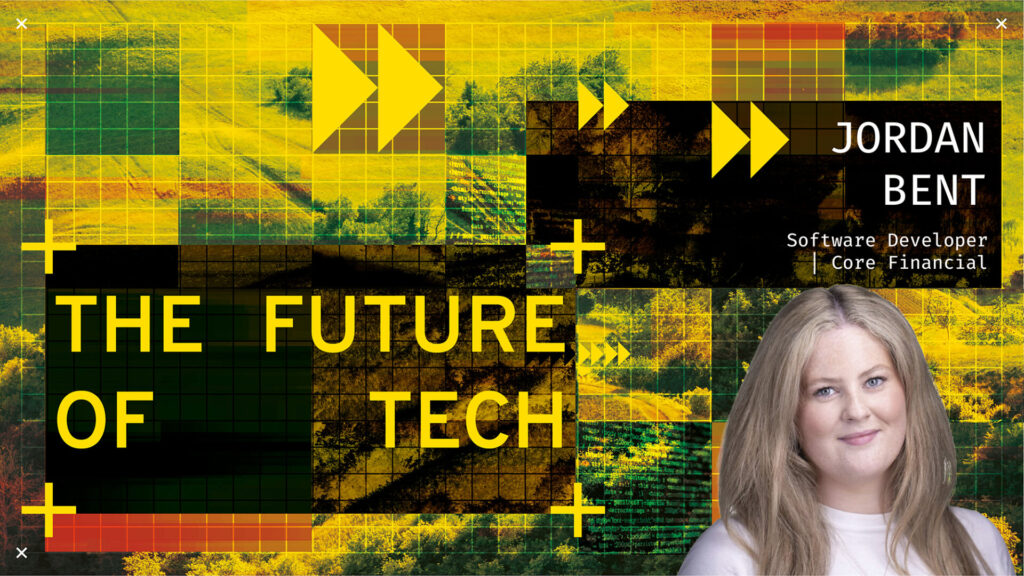Jordan discovered coding in a fourth-year school module led by a teacher with a computer science background. Drawn to its mix of creativity and problem-solving, she pursued Computer Science at Trinity, where she explored everything from low-level programming to AI. After graduating, she moved into software engineering, quickly realising a strong interest in databases and back-end systems. Jordan now works as a Software Developer for Core Financial Systems Limited.
Is there anything you’ve worked on, in college or in your professional life, that really stood out to you? Something that felt like it could make a huge difference or was cutting-edge?
At university, I studied a Computer Vision module, which focused on teaching computers to see. At the time, it felt revolutionary, like giving computers eyes. Self-driving cars were not mainstream yet, so it felt ahead of the curve. The module covered how computers could understand numbers, read signs, and identify images based on colours. It was wild to see how all the basic coding we had learned could be applied to something so functional and impactful.
When Google released their image search feature, where you can take a picture and search it, I was like, “Wow, this is real now.” I thought it would take much longer to see that kind of impact, but everything moves so fast. Now it’s standard, and you can’t escape it. Even self-driving cars are becoming more functional and common.

I remember a time when a computer’s language ability was extremely limited. For example, when YouTube first introduced auto-generated captions, it seemed miles away from being able to replace actual people, but now it is on par. Seeing how the computer can now basically ‘hear’, ‘speak’ and ‘see’, it is interesting to see what other senses it will be able to master. I would love to see it tackle smell.
On the flip side, giving technology the ability to see raises the issue of security. Faces can be recognised and stored from any photo/video. While it has its benefits for the likes of law enforcement being able to scan security footage, for the average person, there is an aspect of surveillance that feels like it has crept into the culture. Regardless of what you are doing, you are aware that there will be a record of it somewhere in a database.
How is the nature of the software engineering profession changing? Are the skills in demand shifting, and could this make software engineers obsolete altogether?
Software engineers are unlikely to become completely obsolete, as there will always be problems that need fixing. However, the required skill sets are definitely evolving. The level of technical depth once expected is no longer necessary for many roles. Even in recent years, graduates have entered the field with less technical foundation than their predecessors, simply because tools and resources have made learning more accessible.

It doesn’t make sense to educate everyone to the highest level if only a few roles truly demand it.
I’ve noticed this shift somewhat, both in my own work and among peers. The types of jobs being advertised now feel different. When I was first job hunting, especially in banking or startups, the roles were more technical and targeted a certain personality type. Today, tech is broader; it’s not just about being a coder behind a screen. Companies value people who are polished and personable, and those traits are becoming more common in tech. Every company has some IT function now, so there is a wider range of opportunities. In my last role, people with the right attitude and a degree were trained into both development and architecture roles. Learning is more accessible now, and companies are leaning into that. It is quicker and cheaper to train someone than to find a perfect fit.
Do you think there’s a common practice in software engineering that will become obsolete in the next few years?
If you’re good at finding the right information, you can solve problems faster. Now, ChatGPT does that for you, so the skill of digging through Stack Overflow or GitHub might fade away. I have been a bit wary about fully jumping on the AI train. I don’t use ChatGPT that much myself because I feel like it can dumb people down a bit. In college, half of being a good developer was being a good Googler.
AI has created a new issue: diminishing knowledge sharing. Tech professionals used to share their solutions online, which helped everyone learn. Now, people just ask ChatGPT directly to generate the code they need and build on something that already exists. As a result, developers are not contributing new knowledge to the wider community. Those small, repetitive tasks, especially front-end starter code, are getting phased out. If that keeps happening, we might reach a point where the AI has no new information to learn from. Additionally, with platforms like Azure, a simple click of a button creates a whole server or app, something that used to be someone’s entire job.

Are there any technologies or trends people should be paying more attention to right now?
I find the medical tech space interesting. I don’t work in it, and it feels quite different from what I do day-to-day, as there is more of a focus on hardware and the analytics that come from that, and then figuring out how to process that data.
What I find fascinating is how quickly it’s evolving; how devices like an Apple Watch now track things like how steadily you’re walking or how much daylight you’re getting. I often think I am active, but when the watch tells me otherwise, it motivates me to get up and do something. It confronts me with the numbers, so while you can lie to yourself, the numbers don’t lie!
However, I wonder where this technology could go.

It is easy to become obsessive, but it’s still such an interesting area where technology is genuinely helpful for everyday people.
You get this immediate feedback and lifelong data tracking. I can already see my stats going back to 2021. Imagine what it’ll be like in 20 years when people have that kind of data going all the way back to their teenage years. It will be fascinating to see how it gets used.
Are there any downsides to these technologies and the constant monitoring?
It is interesting to have a log of everything you do/have ever done, be it your steps or every movie you watched. While it is not a new concept, there is an aspect to it all being stored online by other parties that changes the simple task of logging our actions. Maybe we are too lazy to simply write things down anymore, or we would rather see it through a nice interface and harness the data processing available when that information is all digitised.

They become profitable from this information, but in this day and age, it seems that our online data has become a currency that we are willing to pay with.
Do you ever think about where all that data is going; who is using it and how it might be used in the future?
Not really, perhaps it is a generational thing; our data has always been available. We all signed up for Facebook before we even hit our teenage years, so sharing data doesn’t seem like a big deal. My parents are a lot more cautious when it comes to sharing online. For me, these companies are going to get our data anyway. These days, if something is free, you are paying for it with your data.
That’s why everything’s on an app now, even getting a Tesco meal deal means using the app and signing up for a Clubcard. Businesses want your data so they can sell it. But I accept that, it’s the trade-off we make to access these services. I am not too worried about what they’ll find out about me or how much they’re making from it.
Are we moving too fast with new technologies – jumping on board without really thinking about the consequences?
Yeah, especially with AI. A lot of companies jumped on the bandwagon to appear cutting-edge, even if they don’t fully understand the best way to use it.

We learned a bit about this in a first-year module called Computers and Society, which covered the ethics of programming and the potential real-world impact of these technologies. But it seems like, in reality, those ethical considerations aren’t top of mind for a lot of companies. The global effect doesn’t seem to be thought through, or if it is, any negative is weighed out by the perceived positives; they release something fun and interesting without considering how it could affect millions of people. Maybe they assume it won’t reach that scale, or maybe they’re more focused on the potential for profit.
For example, there needs to be an exorbitant amount of energy available to process an AI query and to run these models at the current rate, and that amount of processing requires a whole host of cooling, which again increases the energy used up. With the mass global adoption of the AI models, it seemed the benefits of them outweighed any consideration for these factors. Then, companies want to have their own AI, with every Google query now also being an AI query; the status they gain from the use of AI outweighs any other consideration.
Are there voices or perspectives missing from the tech community that you’d like to see more of?
Yes. It’s sad because it’s not just that those voices are missing; they are often silenced.

As a woman in tech, I see other women who are in leadership roles, and there are always events and networks that help us connect. At my previous company, my manager was a woman, and I had the opportunity to meet others in senior engineering roles. So, I have definitely noticed more women around me, especially early in my career. Globally, the people making the most noise about tech are still predominantly male. I would love to see more diverse voices being heard, not just present, but actually listened to. They are out there; they just aren’t being given the platform to speak as loudly. They’re too busy actually doing the work, not shouting the loudest.
What is The Future of Tech?
It’s interesting to imagine where tech can go, considering how ingrained it is in our culture. It is in everything we do. I feel an industry that was really brought into the future by technology was banking, in how it has harnessed every aspect of tech to make banking better for people day to day. Now it’s as easy to send/spend money online as it is to simply hand it over physically.
I would love for the healthcare industry to follow suit, especially in Ireland. There seems to be a huge barrier to doing this, especially regarding security, but I can see it revolutionising so many people’s day-to-day lives. Making tasks such as prescriptions, appointments, and access to records easy would really help people. Big picture, technology can help advance the healthcare industry practically. We have seen the likes of robotic surgeons that are allowing us to do things that humans can’t, and it will be interesting to see where this leads, and something I am looking forward to.
Check out all of the interviews in our Future of Tech series here>>> , listen on Spotify>>>> or watch the videos on our LinkedIn page>>>>


 Jump Back
Jump Back

